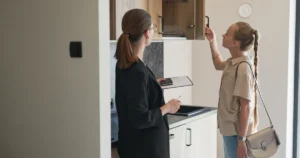For many approaching retirement, the home that once made perfect sense might not be the best fit anymore. Maybe the kids are grown, the stairs feel a little steeper than they used to, or the upkeep is starting to feel like a second job.
The large family home that once made sense may now feel like too much to manage, too expensive to maintain, or simply not aligned with how you want to live in your next chapter. That’s where the idea of right-sizing comes in.
Right-sizing means moving into a home that better fits your current and future needs. It might be smaller, more accessible, closer to family, or located in a low-maintenance community. Whether you’re looking to simplify your life, preserve your retirement savings, or finally get the home you really want, here are seven signs it may be time to make a move.
1. You Have More Space Than You Use
If your kids have moved out and your home feels emptier than ever, you may be paying for space you no longer need. Heating, cooling, cleaning, and maintaining rooms that go unused is not only costly but also unnecessary.
2. Your Home Requires Too Much Upkeep
As homes age, they require more care. From lawn work to roof repairs to unexpected maintenance costs, many retirees find themselves spending more time and money on their homes than they’d like. A right-sized home can reduce or eliminate many of these burdens.
3. You Want to Free Up Cash for Retirement
Selling a larger home and moving into one that is more affordable can unlock the equity you’ve built over the years. That extra cash can support your retirement goals, including travel, health care, family support, or simply peace of mind.
4. You’re Thinking About Moving Closer to Family or Friends
Many retirees consider moving to be closer to adult children or grandchildren. Right-sizing makes that transition easier by helping you find a home in a more convenient or family-friendly location, whether it’s across town or across the country.
5. Your Home Layout Is No Longer Ideal
Two-story homes, narrow doorways, or large yards may not be ideal as mobility and accessibility become more important. Choosing a home with a better layout now can help you live comfortably for years to come.
6. You’re Spending Too Much Time Managing Your Home
If you’re spending more time on home maintenance than on enjoying retirement, it might be time to look for a better fit. A right-sized home can help you spend less time on chores and more time doing what you love.
7. You Want to Eliminate Monthly Mortgage Payments
Many retirees live on a fixed income and want to reduce their monthly expenses. With the right financial strategy, it is possible to purchase a new home without a monthly mortgage payment, helping you stretch your savings further.
Benefits of a Lifestyle Home Loan
This FHA-insured financing option is available to homebuyers age 62 and older and offers several benefits:
- Increase your buying power by 40 to 60 percent compared to a cash-only purchase
- Avoid monthly mortgage payments* with a one-time down payment
- Preserve your retirement savings and keep more cash on hand
- Move closer to family or into a better-fitting home without taking on added debt
This flexible loan program can help you purchase the home you truly want while protecting your long-term financial security.
Ready to Right-Size with Confidence?
If you are thinking about downsizing, upsizing, or simply finding a better fit for your retirement lifestyle, now is a great time to explore your options. A right-sized home can improve your quality of life and help you retire on your terms.
Keller Home Loans, in partnership with Mutual of Omaha Reverse Mortgage, is here to help. Our mortgage specialists can walk you through how the Lifestyle Home Loan works and help you decide if it’s the right option for you.
Contact us today to learn more and take the next step toward your ideal retirement home.
Right-sizing doesn’t always mean going smaller. It means choosing a home that feels “just right” for this next chapter of life. Here are seven signs you may be ready to make that move.
*Must be primary residence, maintain taxes, insurance and HOA if applicable.






